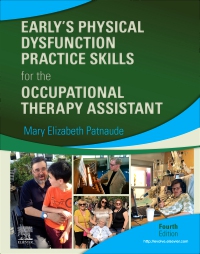
Early’s Physical Dysfunction Practice Skills for the Occupational Therapy Assistant, 4th Edition
Hardcover

Now $99.50
Master the role and skills of the OTA in caring for adults with physical disabilities! Early’s Physical Dysfunction Practice Skills for the Occupational Therapy Assistant, 4th Edition is the only textbook on the rehabilitation process written specifically for OTA students and practitioners. It takes a client-centered approach, following the latest Occupational Therapy Practice Framework in addressing topics such as assessment, intervention principles, and clinical applications. New to this edition is an Intervention Principles for Feeding and Eating chapter plus the latest advances in OT technology. From a team of expert contributors led by Mary Elizabeth Patnaude, this book shows how you can succeed in the OTA role and help clients learn to perform functional tasks.
Newer Edition Available
Early’s Physical Dysfunction Practice Skills for the Occupational Therapy Assistant
-
- Coverage of advances in OT assessment and intervention includes prosthetics and assistive technologies, along with the assessment and interventions of TBI (traumatic brain injury) problems related to cognitive and visual perception
- Case studies offer snapshots of real-life situations and solutions, with many cases threaded through an entire chapter
- Client-centered approach shows how to include the client when making decisions about planning and treatment, using the terminology and abbreviations from the Occupational Therapy Practice Framework
- Evidence-based content includes clinical trials and outcome studies, especially those relating to intervention
- Cultural diversity and cultural sensitivity information helps you understand the beliefs and customs of other cultures so you can provide appropriate care
- Information on prevention addresses safety and the prevention of accidents and injury
- Key terms, chapter outlines, and chapter objectives introduce the essential information in each chapter
- Reading guide questions and summaries in each chapter make it easier to measure your comprehension of the material
-
- NEW! Intervention Principles for Feeding and Eating chapter is added to this edition
- NEW! Reorganization of all chapters aligns content more closely with the Occupational Therapy Practice Framework
- NEW! Combined chapters make the material more concise and easier to navigate
-
PART 1: FOUNDATIONS
1. Occupational Therapy and Physical Disabilities
2. The Disability Experience and the Therapeutic Process
3. Infection Control and Safety Issues in the Clinic
PART II: PROCESS
4. Occupational Therapy Process: Evaluation and Intervention in Physical Dysfunction
5. Documentation of Occupational Therapy Services
PART III: ASSESSMENT
6. Assessment of Motor Control and Functional Movement
7. Assessment of Joint Range of Motion
8. Assessment of Muscle Strength
9. Evaluation and Observation of Deficits in Sensation, Perception and Cognition
PART IV: INTERVENTION PRINCIPLES
10. Teaching and Learning in Motor Performance in Occupational Therapy
11. Intervention Principles for Feeding and Eating NEW!
12. Occupations, Purposeful Activities, and Preparatory Activities
PART V: PERFORMANCE IN AREAS OF OCCUPATION
13. Activities of Daily Living
14. Assistive Technology
15. Moving in the Environment
16. Work
17. Promoting Engagement in Leisure and Social Participation
PART VI: INTERVENTIONS FOR PERFORMANCE SKILLS AND CLIENT FACTORS
18. The Older Adult
19. Principles of Orthotic Intervention
20. Neurotherapeutic Approaches to Treatment
21. Interventions for Visual and Other Sensory Dysfunction
22. Interventions for People with Cognitive and Perceptual Deficits
PART VII: CLINICAL APPLICATIONS
23. Cerebrovascular Accident
24. Traumatic Brain Injury
25. Degenerative Diseases of the Central Nervous System
26. Spinal Cord Injury
27. Neurogenic and Myopathic Dysfunction
28. Arthritic Diseases
29. Upper Extremity Rehabilitation
30. Burns
31. Amputation and Prosthetics
32. Cardiac Dysfunction and Chronic Obstructive Pulmonary Disease
33. Oncology
34. HIV Infection and AIDS



 as described in our
as described in our 